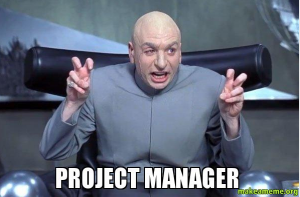
The term Project Manager is much abused. We look at a precise definition of what Project Manager means in a systemic organization, where projects make up the nervous system of the organization.
An organization is essentially a network of projects with a goal
An organization is essentially a network of projects with a goal. There are projects that are brand new and projects that are recurrent, like closing the books. This may be difficult to realize when we look at organizations through the distorted lens of hierarchy and functions, but at the deepest level it is how an organization actually works. Projects require resources, and these resources have to be managed in order to complete projects on time, within specs and within budget; this is the role of the Project Manager.
Blame it on the Project Manager
However, in spite of the existence of professional bodies, projects are regularly not delivered as planned. Is it the fault of the Project Manager? More likely, it is the fault of the method. A method is likely to fail if it does not take into account that:
- resources are finite
- tasks are interdependent
- wrong behaviours such as multi-tasking and procrastination are lethal
This was the insight of Dr. Eliyahu Goldratt who developed the Critical Chain method for Project Management. Critical Chain represents the embodiment of a vision of the organization that is systemic and based on pace of flow, people’s involvement and great emphasis on quality. True to its systemic nature, Critical Chain protects the entire project, not single tasks, through a project buffer to absorb variation as it accumulates through the interdependent tasks and with feeding buffers to accommodate for activities that do not directly impact the length of the project. We give the name Critical Chain to the longest sequence of dependent events taking into consideration the sharing of resources. This sequence determines the length of the project, and this is the limiting factor (constraint) of the project itself.
When used judiciously, Critical Chain becomes then much more than simply an algorithm to accelerate project completion; it is the vehicle to integrate, control and deploy the resources of the organization.
What does a Project Manager do?
The role of the Project Manager in a Critical Chain approach is both critical and yet simple. Their job is to:
- Identify the Critical Chain (various softwares can assist with this process)
- Shorten the Critical Chain (Here the difficulty is in challenging the assumptions that we make about the impossibility to replace some of the assigned resources with some idle ones. Naturally, we do not underestimate the skills needed for the task but we firmly believe that training can help elevate people’s skills and unleash more necessary resources into the system)
- Assign project buffer and feeding buffers
- Update the Project with task execution day by day to spot possible delays to, or earliness of, project completion
- Measure buffer consumption (using control charts) so we know that project execution is predictable or that we have to investigate reasons for anomalous buffer consumption (or increase of buffer in case of systematic early completion)
- Exert a special control on the resources involved in tasks belonging to the Critical Chain and alert the resources next in line in order to capitalize on early task completions
What happens when people don’t do what they’re supposed to do?
Once everything is clearly mapped out and everyone knows what they are supposed to do and when, and the Project Manager knows when to alert people to be ready but the task is not carried out, what is going on?
There can be many reasons why people do not act when they are supposed to act. One reason can be a misalignment of authority and responsibility that prevents someone from taking action. Another can be an unverbalized conflict that keeps a person paralyzed an unable to act. In the next post we will look at ways to tackle these problems.
Sign up to our blog here and shift your thinking towards broader, systemic possibilities for yourself and your organization. Intelligent Management provides education and training on systemic management, W. Edwards Deming’s management philosophy and the Theory of Constraints (Decalogue methodology) in North America and Europe.
About the Author
Angela Montgomery Ph.D. is Partner and Co-founder of Intelligent Management and author of the business novel+ website The Human Constraint that has sold in over 20 countries. She is co-author with Dr. Domenico Lepore, founder, and Dr. Giovanni Siepe of ‘Quality, Involvement, Flow: The Systemic Organization’ from CRC Press, New York.





Leave a Reply